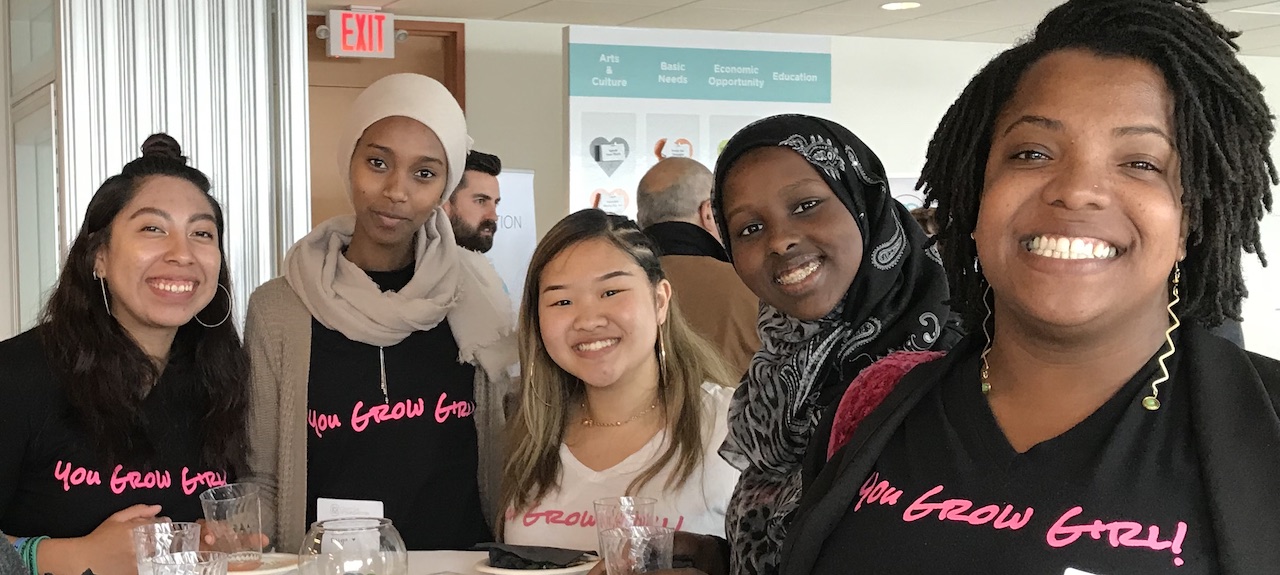COVID-19 Response Fund helps organizations meet the spike in demand for accessible, culturally relevant services.
By Sally Gillis, Managing Director, Strategic Impact and Partnerships
“Mental health resources for people of color are overlooked, especially equitable access for girls and women,” says Jamila Coleman, founder and executive director of You Grow Girl!, a nonprofit that supports and is led by female-identifying youth of color.
COVID-19 has strained an already stretched mental health system. Youth who face emotional or physical abuse, substance use, or mental health challenges at home often rely on school as a safe place to receive care. But without school or summer programs in session, many are spending more time in increasingly turbulent home environments. Even for whose homes are usually stable, the financial strain and social isolation of the pandemic have taken a toll.
“Prior to COVID, we got four or five referrals to our behavioral health and case management programs each month. Now we’re getting two or three per day—and we never turn anyone away,” Coleman says. You Grow Girl! is one of nearly 60 organizations that recently received grants from the COVID-19 Response Fund to address mounting mental and behavioral health challenges, particularly for underserved people of color. These grantees are supporting individuals and families who are battling prior trauma from before the pandemic as well as current trauma caused by isolation, stress, economic anxiety, intimate partner violence, and child abuse. They are also helping frontlines workers experiencing secondary trauma and grief from supporting people and communities in distress.
Access to mental and behavioral health services is critical during the pandemic, yet organizations face many hurdles in providing care to the region’s vulnerable populations. Risho Sapano is the executive director of Mother Africa, an organization that provides holistic support for African immigrants and refugees and their families. She explained that seeking help is uncommon in the communities they serve because conversations around mental health have yet to be normalized. For those who do ask for assistance, available services are rarely in their language or sensitive to cultural practices like accommodating different religious traditions or navigating privacy concerns in multi-generational households.
To increase access to services, Mother Africa will use part of its COVID-19 Response Fund grant to host a series of online forums that share information on symptoms of common mental health conditions, like depression and anxiety, and discuss strategies for coping with these conditions. The forums will also link people to appropriate treatment options.
Getting the right treatment requires hiring the right people. “We hire from within communities of color, with staff of color. They can build rapport with students because they are from the same neighborhoods. It’s my job to keep my staff safe and employed. I’m doing what I can,” says Aileen De Leon, executive director of WAPI Community Services, a nonprofit focused on providing mental and behavioral health resources to people of color.
For young people in particular, privacy with counselors is a pressing issue. Without schools or summer programs in session, many groups can only provide services to young people in their homes. “Much of the trauma youth experience is home-based,” Aileen says. “We continue to offer telehealth for substance use and mental health, but the privacy issue—especially with multiple families under one roof—makes providing services difficult.”
Consejo Counseling & Referral Services similarly works to get appropriate treatment to a diverse population. Consejo was founded to serve Latinx communities, though it provides counseling and behavioral health for anyone who needs services in King, Pierce, Thurston, and Mason counties. Consejo’s clients include refugees and immigrants from 26 Latin American countries, many of whom have experienced extreme violence and trauma. “We serve them all, but they require different levels and types of behavioral and mental health care,” says Mario Paredes, executive director of Consejo.
The COVID-19 Response Fund supports the work You Grow Girl! and Consejo Counseling do with people who don’t qualify for Medicaid. “This is not just undocumented people—the need is much broader,” says Mario of Consejo. His organization serves people who make just a little bit too much money to qualify for Medicaid, veterans who prefer to receive culturally relevant services rather than getting assistance from the VA, and elderly people who are transitioning between Medicaid and Medicare.
Even for clients covered by Medicaid, reimbursement rates are not enough to pay for the services they receive. For each girl in You Grow Girl!’s programs, the organization spends eight to 15 hours each month. But the average reimbursement per girl is only about $315 per month—not sufficient to cover expert interventions and critical wraparound services.
The COVID-19 Response Fund is helping to fill these gaps and alleviate stress around staffing so that organizations can meet growing needs. The Fund helped WAPI pay rent at its two locations and prevent layoffs, and it’s enabling Mother Africa to train staff to recognize when someone is in crisis and provide mental health triage.
In the context of reinvigorated efforts to deconstruct systemic racism, equity in mental health is more critical than ever. “After the hashtags are over, the work still needs to be done,” Jamila says. “We need to fully fund mental health services for people of color. Systemic racism and support for mental health aren’t separate conversations.”
These grants to mental and behavioral health organizations are part of a June round of funding that totaled $9.2 million supporting access to affordable childcare, navigation of mental and behavioral health needs, and emergency financial assistance. The COVID-19 Response Fund launched in early March and has raised $30 million from businesses, philanthropies, and everyday people to support our region’s most vulnerable communities during the coronavirus crisis.
To learn more about the COVID-19 Response Fund and how you can make a difference.


